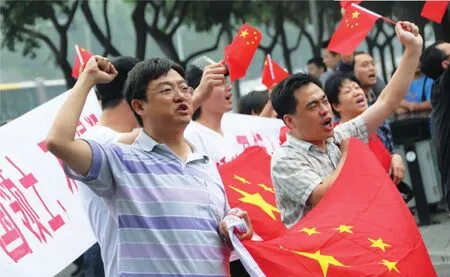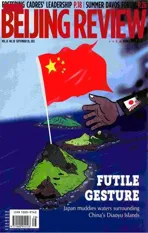NATIONAL DIGNITY AND TERRITORIAL INTEGRITY
2012-10-16DingYing
NATIONAL DIGNITY AND TERRITORIAL INTEGRITY

The Japanese Government’s m isguided decision to “purchase” the Diaoyu Islands may backfire By Ding Ying“E ven Buddha can have a temper,” says an old Chinese proverb. Now, China is enraged by the Japanese Governm en t’s o ffensive stance on the Diaoyu Islands.
Ignoring China’s p rotests, Japan’s Yoshihiko Noda adm inistration insisted on“purchasing” some of the islands from their“owner” in September, provoking China to take a series of countermeasures. Observers pointed out that China w ill not comprom ise,citing concerns over national dignity and territorial integrity. There have been calls for more political, econom ic and diplomatic measures by China to deal w ith the situation,as well as warnings that Japan must accept the consequences of its provocative acts.
Dam aged re la tions
The Diaoyu Islands are China’s territory and China has a legal right to counter Japan’s attempts to seize the islands, said Chinese observers. They warned Japan would start more regional confl icts on territorial disputes if China does not make a strong response.Japan’s position on the Diaoyu Islands is tantamount to a denial of the outcomes of victory in World War II and poses a challenge to the post-war international order.
The Japanese Government signed a contract w ith the Kurihara fam ily, claimed by the Japanese side as the “private owner” of the Diaoyu Islands, on September 11. The “purchase” cost the Japanese Government some 2.05 billion yen ($26.15 million). Two days earlier, Chinese President Hu Jintao had faceto-face talks w ith Japanese Prime M inister Yoshihiko Noda on the sidelines of the annual meeting of the Asia-Pacific Econom ic Cooperation forum in Russia’s V ladivostok.Hu iterated that any method by which Japan tries to “purchase” the islands would be illegal and invalid. China fi rm ly opposes such moves, warning that the “purchase” would hurt relations between the two. On September 10, Chinese Prem ier Wen Jiabao also declared the Diaoyu Islands are an inalienable part of China’s territory and that China w ill“absolutely make no concession” on issues concerning its sovereignty and territorial integrity.
China took a series of countermeasures after Japan’s “buying” of the islands.Demonstrating China’s sovereignty over the islands, Chinese marine surveillance ships reached the waters around the islets. The Chinese Government announced the base points and baselines of the territorial waters of the Diaoyu Islands, which is in accordance w ith China’s law on territorial seas and adjacent zones adopted in 1992.
“The Diaoyu Islands and their affi liated islands have been China’s inherent territory since ancient times. It is w ithin China’s legal rights to announce the boundaries of the territorial waters,” said Qu Xing, President of the China Institute of International Studies(CIIS). Previously, China and Japan had formed a mutual understanding to set aside disputes and maintain the present status quo,w hich was the reason why China didn’t make the declaration earlier, Qu explained.“China w ill never be the fi rst to instigate a dispute,” he said. “But Japan chose to issue this challenge, and China w ill not be daunted by it.”
The Diaoyu Islands, in the East China Sea between China and Japan, have belonged to China since ancient times. For centuries, fishermen from China’s Taiwan, Fujian and other provinces conducted activities such as fishing and collecting herbs in the area. The islands appeared on China’s map as early as the M ing Dynasty (1368-1644). There are records about the islands in a book published during the rule of Emperor Yongle (1403-24), more than 400 years before Japan claimed discovery of the Diaoyu Islands in 1884.
Xing Guangmei, a researcher w ith the Chinese Naval Research Institute, said announcing the boundaries of the territorial waters is a precondition of confi rming water areas under China’s jurisdiction. According to Chinese law, unauthorized foreign vessels,except for civilian ships for innocent passage,should not enter China’s territorial waters, or it can be considered an invasion of China’s territory. And China has legal rights to take any action against invasion. The dispute over the islands has now officially upgraded to the practical confrontation phase, Xing said.
“The Sino-Japanese relationship is at a crossroad of history,” said Ruan Zongze,Vice President of the CIIS. Disputing the islands could be a long-term contest of the two countries’ w illpower, which cannot be settled w ithin a short time. However, Ruan warned,if China doesn’t crush Japan’s aggressive ambition on territorial disputes, the whole of East Asia w ill suffer consequences.
“Japan made m isjudgments on the Diaoyu Islands issue,” Ruan stressed. Its fi rst misjudgment was that it underestimated China’s determ ination to protect its sovereignty and territorial integrity. China is no longer the country it was 100 years ago,when it lacked the ability to fight against foreign invasion, he said. A lthough China sticks to the principle of peaceful development, it w ill never sacrifice sovereignty and territorial integrity.
Japan tried to draw the United States into the Diaoyu Islands issue because of their alliance. But Washington w ill not be led into conflict just for Tokyo’s interests, Ruan stressed.
Fu tu re op tions
Japan’s aggressive acts provoked protests in China, as demonstrations have broken out in many cities. Japan is rem inding the Chinese people of their national hum iliation during World War II, in which millions of civilians and soldiers died in the Japanese invasion from 1937 to 1945. The m ilitary has even released a message alluding to the risk of war against Japan over the Diaoyu Islands.
Compared w ith Japan’s recklessness, the Chinese Government has stayed calm and restrained. While Chinese observers recommend sticking to the principle of a peaceful resolution, they warn that if Japan takes further provocative acts, the bilateral relationship could spin out of control. Once China takes econom ic countermeasures, Japan w ill be hit w ith the consequences of its actions, they pointed out.
There w ill be three possible outcomes of the Diaoyu Islands issue, said Qu. First,the two sides could resume the status quo of putting disputes aside. The precondition is that the Japanese Government strictly prohibits anyone boarding the islands or building any facility on the islands, while China subm its its territorial baseline of the Diaoyu Islands to the UN. Second, civilian conflicts between Japan and the Chinese mainland, Hong Kong, Macao and Taiwan could escalate, hurting the bilateral relationship but w ithout government involvement.Third, Japan could build facilities or station troops on the islands after “nationalizing”the islands, w hich w ill send the bilateral relationship spiraling out of control.“Analyzing the current situation, I think the second one w ill be most probable,” Qu concluded, adding that he still worries about ongoing escalation.
Gao Hong, a senior research fellow w ith the Chinese Academy of Social Sciences, pointed out that a diplomatic fight w ill come fi rst. He noted that neither China nor Japan currently wants to start a military conflict, suggesting that China assert sovereignty over the Diaoyu Islands and put pressure on Japan.
However, if Japan continues to upgrade the confl ict, the political and diplomatic confrontation will spread to the economic realm,triggering a serious reversal of its econom ic relationship w ith China. “The interdependence between the two sides is obvious,” he said, adding that econom ic sanctions w ill be very possible by that time.
China and Japan are the second and third biggest econom ies in the world, respectively,and there is close economic interaction and cooperation between the two. Econom ic and trade confrontation w ill hurt them both, but Japan’s endurance w ill be weaker because of its reliance on the Chinese econom y,said Jin Baisong, a researcher w ith the Chinese Academy of International Trade and Econom ic Cooperation.
Jin explained that Japan’s debt w ill be 195 percent of its GDP by the end of 2012,which is the highest among developed countries. Given Japan’s struggling economy, its sovereign debt is crossing the crisis warning threshold. “Any external or domestic event could trigger a huge economic crisis in Japan,” said Jin. “If China starts economic sanctions, Japan’s tax revenue w ill certainly decrease. A crisis w ill then follow, once national debt owners dump national bonds in a panic.”
Japan’s econom ic reliance on China is much higher than China’s reliance on Japan,Jin pointed out. Although China w ill also see a huge loss from econom ic sanctions against Japan, it can always import from other countries because of the current global econom ic downturn.
“Japan must realize that economic prosperity comes from friendly coexistence w ith its neighbors. Only peace can drive its economic development,” Jin stressed. “China’s economic sanctions w ill show Japan the enormous price it must pay for its aggressive ambition on the Diaoyu Islands issue.”
Ch ina’s Coun te rm easu res
● A number of Chinese government bodies lodged stern protests, including the National People’s Congress, the National Comm ittee of the Chinese People’s Political Consultative Conference, the M inistry of Foreign A ffairs and the M inistry of National Defense
● Chinese marine surveillance ships were dispatched to waters near the Diaoyu Islands
● The Chinese Government announced the base points and baselines of the territorial waters of the Diaoyu Islands
● The China Meteorological Administration started to issue forecasts on temperatures,humidity, w ind speed and rainfall for the Diaoyu Islands
● The State Oceanic Adm inistration of China introduced maritime environment forecasting for the sea around the Diaoyu Islands
